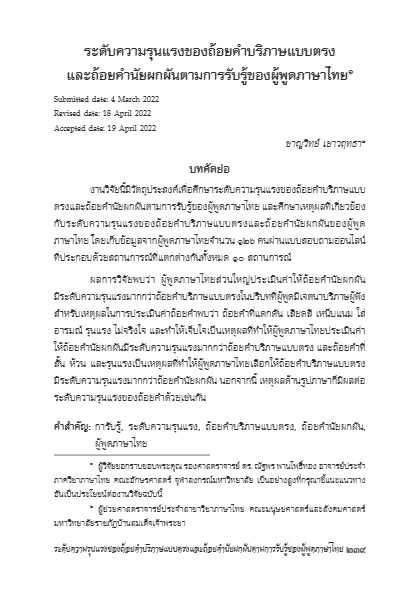ระดับความรุนแรงของถ้อยคำบริภาษแบบตรง และถ้อยคำนัยผกผันตามการรับรู้ของผู้พูดภาษาไทย
ชาญวิทย์ เยาวฤทธา
บทคัดย่อ
งานวิจัยนี้มีวัตถุประสงค์เพื่อศึกษาระดับความรุนแรงของถ้อยคำบริภาษแบบตรงและถ้อยคำนัยผกผันตามการรับรู้ของผู้พูดภาษาไทย และศึกษาเหตุผลที่เกี่ยวข้องกับระดับความรุนแรงของถ้อยคำบริภาษแบบตรงและถ้อยคำนัยผกผันของผู้พูดภาษาไทย โดยเก็บข้อมูลจากผู้พูดภาษาไทยจำนวน ๑๒๖ คนผ่านแบบสอบถามออนไลน์ที่ประกอบด้วยสถานการณ์ที่แตกต่างกันทั้งหมด ๑๐ สถานการณ์ผลการวิจัยพบว่า ผู้พูดภาษาไทยส่วนใหญ่ประเมินค่าให้ถ้อยคำนัยผกผันมีระดับความรุนแรงมากกว่าถ้อยคำบริภาษแบบตรงในปริบทที่ผู้พูดมีเจตนาบริภาษผู้ฟังสำหรับเหตุผลในการประเมินค่าถ้อยคำพบว่า ถ้อยคำที่แดกดัน เสียดสี เหน็บแนม ใส่อารมณ์รุนแรง ไม่จริงใจ และทำให้เจ็บใจเป็นเหตุผลที่ทำให้ผู้พูดภาษาไทยประเมินค่าให้ถ้อยคำนัยผกผันมีระดับความรุนแรงมากกว่าถ้อยคำบริภาษแบบตรง และถ้อยคำที่สั้น ห้วน และรุนแรงเป็นเหตุผลที่ทำให้ผู้พูดภาษาไทยเลือกให้ถ้อยคำบริภาษแบบตรงมีระดับความรุนแรงมากกว่าถ้อยคำนัยผกผัน นอกจากนี้ เหตุผลด้านรูปภาษาก็มีผลต่อระดับความรุนแรงของถ้อยคำด้วยเช่นกัน
คำสำคัญ: การับรู้, ระดับความรุนแรง, ถ้อยคำบริภาษแบบตรง, ถ้อยคำนัยผกผัน, ผู้พูดภาษาไทย
(ตีพิมพ์ใน วารสารไทยศึกษา ปีที่ 18 ฉบับที่ 2 (ธันวาคม 2022) หน้า 239-271)
The Degree of Intensity of Direct Reprimands and Verbal Irony on the Perception of Native Thai Speakers
Chanwit Yaowarittha
Abstract
This research aimed to examine the degree of intensity of direct reprimands and verbal irony on the perception of Native Thai speakers and to investigate the underlying reasons evaluating the degree of intensity from the perception of hearers. Data were collected from 126 native Thai speakers using online questionnaires comprising 10 situations.
The research revealed that the majority of Thai speakers evaluate verbal irony as having a higher degree of intensity than direct reprimands in the context that the speakers intend to reprimand the hearers. For the reasons evaluating the degree of intensity, it was found that, from the perspective
of hearers, sarcastic, satirical, intense, insincere and indignant utterances make verbal irony stronger and more unpleasant than direct reprimands. On the other hand, shortness and abruptness of direct reprimands make them stronger and more unpleasant. Furthermore, linguistic forms were also found as a factor in the evaluation of the degree of intensity of utterances.
Keywords: Perception, Degree of Intensity, Direct Reprimands, Verbal Irony, Native Thai Speakers
(Published in Journal of Thai Studies Volume 18 Number 2 (December 2022) Page 239-271 )
บทความ/ fulltext :8_Chaanwit.pdf
